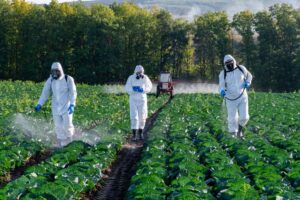Last month, a coalition of six organizations petitioned the EPA to immediately suspend and cancel all glyphosate registrations.
The petition was filed by the Center for Food Safety (CFF), which was joined by Lideres Campesinas, Beyond Pesticides, the Farmworker Association of Florida, Rural Coalition, and Alianza Nacional de Campesinas, Inc. These nonprofits work to protect the environment and farmworkers.
“Glyphosate is the most widely used pesticide in the world, with approximately 300 million (pounds being applied annually just in the [U.S.],” the petition states.
This pesticide is found in a variety of weedkillers, including Roundup Weed & Grass Killer, Roundup QuikPro Herbicide, Ragan & Massey Grass and Weed Killer, RM43 Total Vegetation Control, FarmWorks Grass and Weed Killer, Ranger Pro Herbicide, Ortho GroundClear Vegetation Killer, and KleenUp Weed & Grass Killer.
Roundup QuikPro Herbicide contains the most glyphosate, with concentrations of up to 73.3%, reports Schmidt & Clark LLP.
FIFRA
The EPA regulates pesticides under the Federal Insecticide, Fungicide, and Rodenticide Act (FIFRA), which provides for federal regulation of pesticide distribution, sale, and use. All pesticides distributed or sold in the United States must be registered (licensed) by the EPA. Before the Agency can register a pesticide under FIFRA, the applicant must show, among other things, that using the pesticide according to specifications “will not generally cause unreasonable adverse effects on the environment.”
FIFRA defines the term “unreasonable adverse effects on the environment” to mean:
- “Any unreasonable risk to man or the environment, taking into account the economic, social, and environmental costs and benefits of the use of any pesticide, or
- a human dietary risk from residues that result from a use of a pesticide in or on any food inconsistent with the standard under section 408 of the Federal Food, Drug, and Cosmetic Act.”
Background
According to the CFF, glyphosate was last subject to a comprehensive reevaluation in 1993. FIFRA requires the Agency to review pesticide registrations every 15 years to determine if the product still meets required federal safety standards.
“EPA only began this registration review process for glyphosate in 2009, issuing an interim decision in 2020,” states a CFF press release. “Despite spending eleven years on its review, EPA’s pesticide division was unable to reach a conclusion as to whether glyphosate causes non-Hodgkin’s lymphoma (NHL). The [Agency] nevertheless dismissed glyphosate’s overall cancer risk, deeming it ‘not likely’ to cause cancer. NHL is the cancer linked to glyphosate in many epidemiology studies of farmers, and in assessments by scientists with EPA’s science division. It is also the cancer associated with glyphosate by the world’s foremost authority on carcinogens, the World Health Organization’s International Agency for Research on Cancer. Many NHL sufferers who attributed their cancer to use of Roundup have won lawsuits against Monsanto/Bayer.”
The U.S. Court of Appeals for the 9th Circuit struck down the EPA’s cancer and broader human health assessment of glyphosate in 2022 in a lawsuit brought by the CFF, meaning the EPA currently lacks a legal glyphosate assessment supporting its continued use.
At that time, “the court found EPA’s cancer assessment of glyphosate internally contradictory and violative of EPA’s own guidelines for Carcinogen Risk Assessment,” according to the CFF press release. “Similar criticisms were levied by an EPA-appointed expert Scientific Advisory Panel, and EPA scientists from outside the pesticide division.
“The court also remanded the ecological risk assessment of glyphosate to EPA, with a deadline to complete it. EPA failed to meet this deadline, and instead chose to withdraw the entire interim registration review decision. Congress subsequently extended EPA’s deadline for completing registration reviews of glyphosate and all other pesticides previously due for completion by October 2022 to October 2026.”
Without a current assessment, the Agency is left to rely on its 1993 assessment, which doesn’t account for the increased use of the pesticide and several completed studies since then that point to extensive risks to human health and the environment.
“The threat of glyphosate is way outside the bounds of any reasonable person’s definition of acceptable harm, surpasses allowable risk under federal pesticide law, and represents the poster child for what has gone dangerously wrong with EPA’s program to control toxic pesticides in our environment, homes, workplaces, and communities, with disproportionate injury to farmworkers and landscapers,” said Jay Feldman, executive director at Beyond Pesticides, in the organization’s blog. “This petition attempts to hold EPA accountable to the rule of law, while recognizing that glyphosate, which causes adverse effects to biological systems—from soil microbiota to the gut microbiome, can be replaced by cost-effective organic food production and land management of parks, playing fields or lawns.”
According to the petition, glyphosate also harms the environment.
“By decimating milkweed, glyphosate has been a major factor in the decline of the monarch butterfly, and many Roundup formulations are extremely toxic to amphibians,” the CFF press release adds. “EPA itself has found that glyphosate is likely to adversely affect an incredible 93% of threatened and endangered species, and 96% of the critical habitat that supports them.
“For all of these reasons, EPA cannot meet the required safety standard for glyphosate’s currently approved uses and must cancel its registration.”
The petition was filed with the EPA on December 13, 2023, and it has 180 days, by law, to grant or deny the petition.

